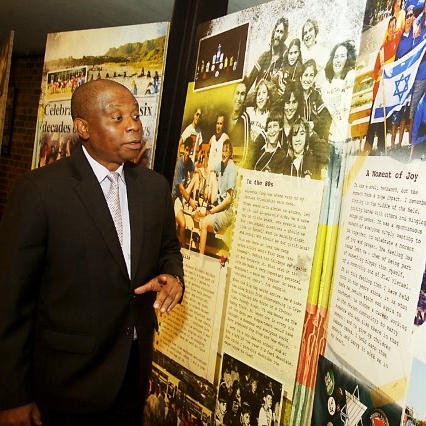
News

Mayor Mashaba wants more Jews in Jozi
ROBYN SASSEN
“And I’d like to tell the rabbis to please get us another 80 000 and bring them here to Johannesburg. We still have space for them,” he added, warmly reflecting on the community’s historical reputation for its work ethic and its economic sensibilities.
“I speak to you not only as the city’s executive mayor, but also as a capitalist with a strong respect for the value of capitalism to a city’s growth.”
Reflecting on the community’s collective contribution to the development of Johannesburg as well as its entrepreneurial flair, he said that it has “provided the foundation we will be building on as our city reaches its potential as the economic heartbeat of our country. In the past years, we have seen our country deteriorate.”
He condemned the greed of the state and itemised South Africa’s problems, from potholes to unemployment, lawlessness to vanity projects funded by taxpayers, which have compromised the dignity of the country’s people.
“But we are determined not to despair.” He explained the mayoral office’s plans to address these issues with initiatives to revitalise the inner city to make it attractive for investors again.
Digressing to mention the bloodstain of the Holocaust and the disgrace of apartheid, he said that both should be retained in the country’s collective memory.
“They need to be retrievable memories, to ensure that we never allow our humanity to be brought to these low levels. Human hate starts with a stripping of others of their humanity, because they are different. We need to be an active citizenry that is deliberate about training future generations ensuring that tolerance and respect take precedence over discrimination and hate.
“The Jewish community has given us some of the country’s most ardent struggle heroes,” he went on, citing a long list of luminaries in the community who were prominent in the fight for democracy, but more than the heroes are the ordinary people, who have been willing to work hard to make their city grow and prosper.
Indeed, the focus of this exhibition is on those unsung heroes, as Gavin Morris, the director of Cape Town’s South African Jewish Museum, explained. The exhibition was designed and created by the SAJM team, and is currently on loan by the JHGC for a period of eight weeks.
Shaun Zagnoev, chairman of the Gauteng Council, as MC of the event, explained the evolution not only of the exhibition which was designed and made in Cape Town under the auspices of the South African Jewish Museum, but also the trajectory of the community itself, which reached from the arrival of impoverished immigrants in 1841 to the development of a vibrant community distinguished by leaders and giants.
He spoke of the ordinary people who too contributed to broader society.
“The Jews in South Africa have adapted to the challenges of their environment and have created the infrastructure through which to ensure the continuation of their age-old religious and cultural heritage,” he said with regard to the community’s welfare system, educational achievements and institutions and charities, as well as the idea of South Africa remaining “home” even for ardent Zionists.
“SA Jewry is a can-do community,” he added. “They rise to the occasion, when circumstances demand. We have overcome the most formidable challenges in the past, and I believe we have the capacity to deal with the future’s challenges similarly.”
Morris offered lucid insight into the thinking behind the exhibition itself, which is on show on the second floor of the Centre. “This exhibition was a very difficult proposition for the museum, as the core of the SAJM’s permanent display is focused on the trajectory of the community.
“We hit upon a new approach – the personal stories – the stories of you and I. There are personal anecdotes and photographs on display here. No names are mentioned, no photographs are captioned. The reason we did this was to avoid faribels!
“You will find familiarity, nostalgia, memories from your own youth, here. The exhibition has no chronological coherence. It doesn’t focus on famous faces. It’s a ticket to your own memories: our past, present and future.” He mentioned the museum’s digital archive project that is currently under development, aiming to collect and retain the communities’ collective records.
Declaring the exhibition open, director of the JHGC Tali Nates, concluded the proceedings by making a special point of welcoming Chief Rabbi Warren Goldstein and his wife Gina, trustees of the Centre, on their first visit to the centre.




